Annotated Bibliography: Sustainability in Environmental Science
VerifiedAdded on 2022/08/24
|6
|1228
|113
Annotated Bibliography
AI Summary
This annotated bibliography presents a collection of scholarly articles and research papers focused on the multifaceted concept of sustainability. The included sources cover a wide range of perspectives, from environmental concerns like pollution and biodiversity loss to corporate sustainability and organizational change. The bibliography explores how sustainability is addressed across different sectors, including higher education and health programs. Key themes include systems integration, stakeholder engagement, and the challenges of sustainable urbanization, with examples from various global contexts. Each entry provides a concise summary of the source's content, highlighting key arguments and findings. The collection aims to provide a comprehensive overview of sustainability, encompassing its environmental, social, and economic dimensions, and the efforts being made to achieve it.
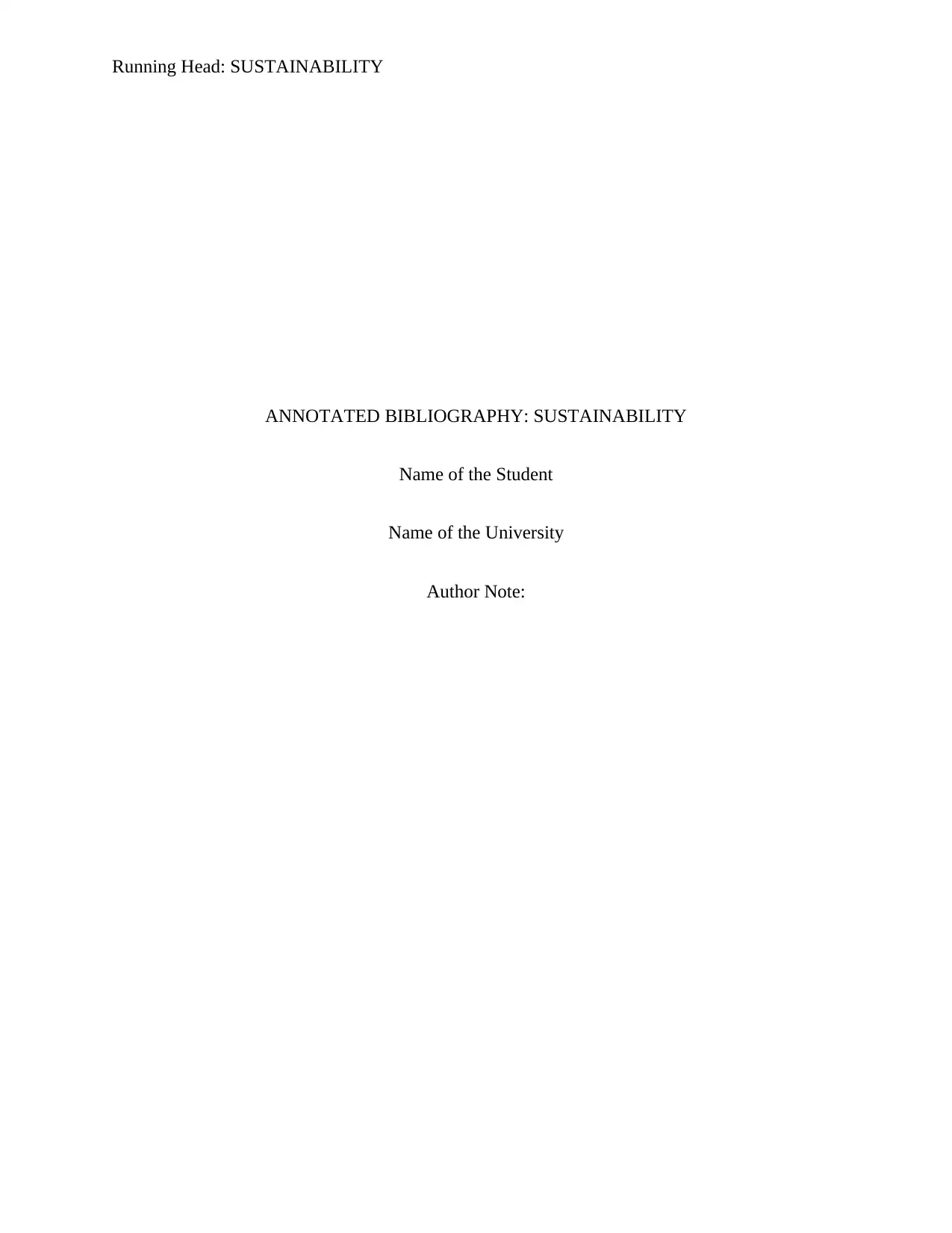
Running Head: SUSTAINABILITY
ANNOTATED BIBLIOGRAPHY: SUSTAINABILITY
Name of the Student
Name of the University
Author Note:
ANNOTATED BIBLIOGRAPHY: SUSTAINABILITY
Name of the Student
Name of the University
Author Note:
Paraphrase This Document
Need a fresh take? Get an instant paraphrase of this document with our AI Paraphraser
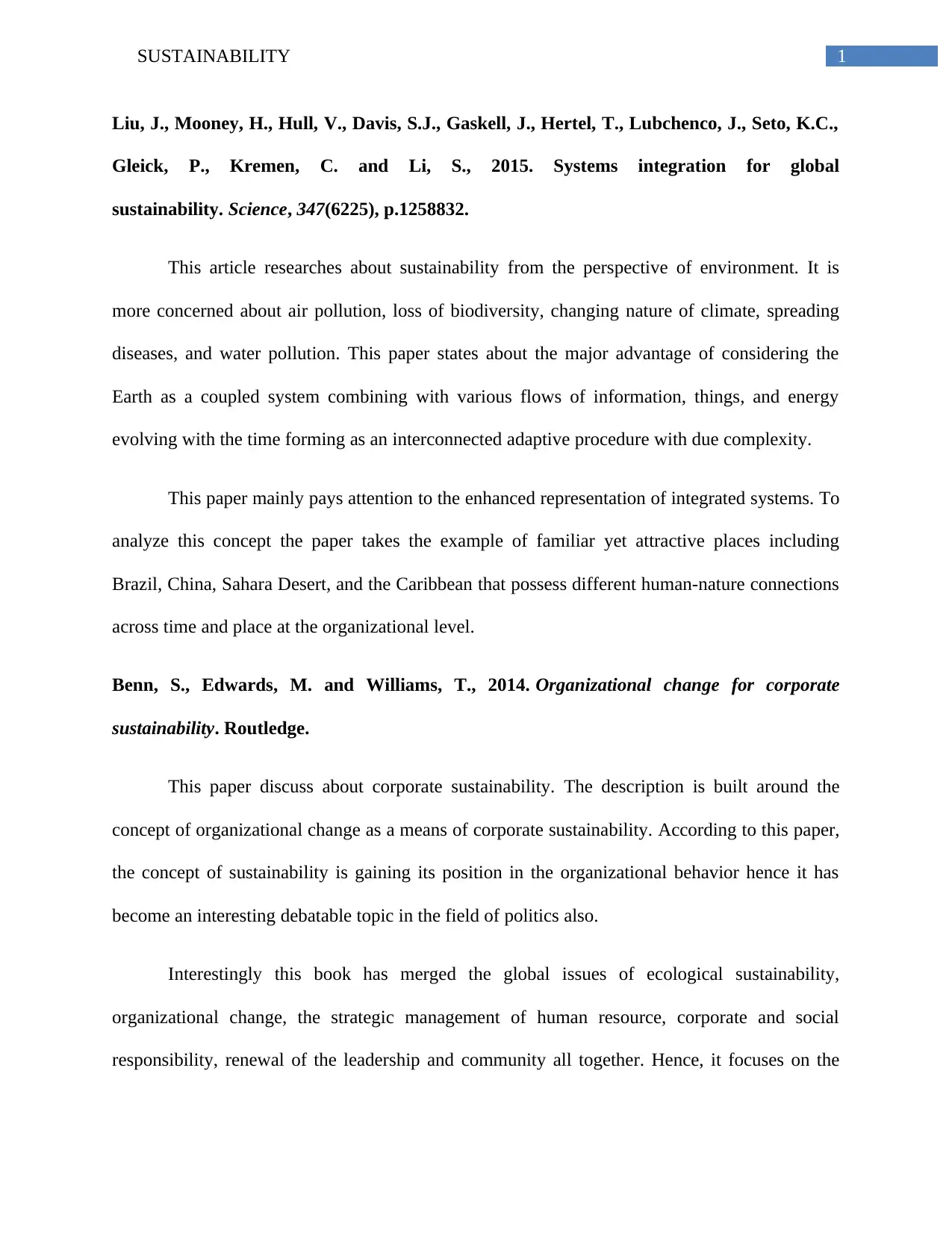
1SUSTAINABILITY
Liu, J., Mooney, H., Hull, V., Davis, S.J., Gaskell, J., Hertel, T., Lubchenco, J., Seto, K.C.,
Gleick, P., Kremen, C. and Li, S., 2015. Systems integration for global
sustainability. Science, 347(6225), p.1258832.
This article researches about sustainability from the perspective of environment. It is
more concerned about air pollution, loss of biodiversity, changing nature of climate, spreading
diseases, and water pollution. This paper states about the major advantage of considering the
Earth as a coupled system combining with various flows of information, things, and energy
evolving with the time forming as an interconnected adaptive procedure with due complexity.
This paper mainly pays attention to the enhanced representation of integrated systems. To
analyze this concept the paper takes the example of familiar yet attractive places including
Brazil, China, Sahara Desert, and the Caribbean that possess different human-nature connections
across time and place at the organizational level.
Benn, S., Edwards, M. and Williams, T., 2014. Organizational change for corporate
sustainability. Routledge.
This paper discuss about corporate sustainability. The description is built around the
concept of organizational change as a means of corporate sustainability. According to this paper,
the concept of sustainability is gaining its position in the organizational behavior hence it has
become an interesting debatable topic in the field of politics also.
Interestingly this book has merged the global issues of ecological sustainability,
organizational change, the strategic management of human resource, corporate and social
responsibility, renewal of the leadership and community all together. Hence, it focuses on the
Liu, J., Mooney, H., Hull, V., Davis, S.J., Gaskell, J., Hertel, T., Lubchenco, J., Seto, K.C.,
Gleick, P., Kremen, C. and Li, S., 2015. Systems integration for global
sustainability. Science, 347(6225), p.1258832.
This article researches about sustainability from the perspective of environment. It is
more concerned about air pollution, loss of biodiversity, changing nature of climate, spreading
diseases, and water pollution. This paper states about the major advantage of considering the
Earth as a coupled system combining with various flows of information, things, and energy
evolving with the time forming as an interconnected adaptive procedure with due complexity.
This paper mainly pays attention to the enhanced representation of integrated systems. To
analyze this concept the paper takes the example of familiar yet attractive places including
Brazil, China, Sahara Desert, and the Caribbean that possess different human-nature connections
across time and place at the organizational level.
Benn, S., Edwards, M. and Williams, T., 2014. Organizational change for corporate
sustainability. Routledge.
This paper discuss about corporate sustainability. The description is built around the
concept of organizational change as a means of corporate sustainability. According to this paper,
the concept of sustainability is gaining its position in the organizational behavior hence it has
become an interesting debatable topic in the field of politics also.
Interestingly this book has merged the global issues of ecological sustainability,
organizational change, the strategic management of human resource, corporate and social
responsibility, renewal of the leadership and community all together. Hence, it focuses on the
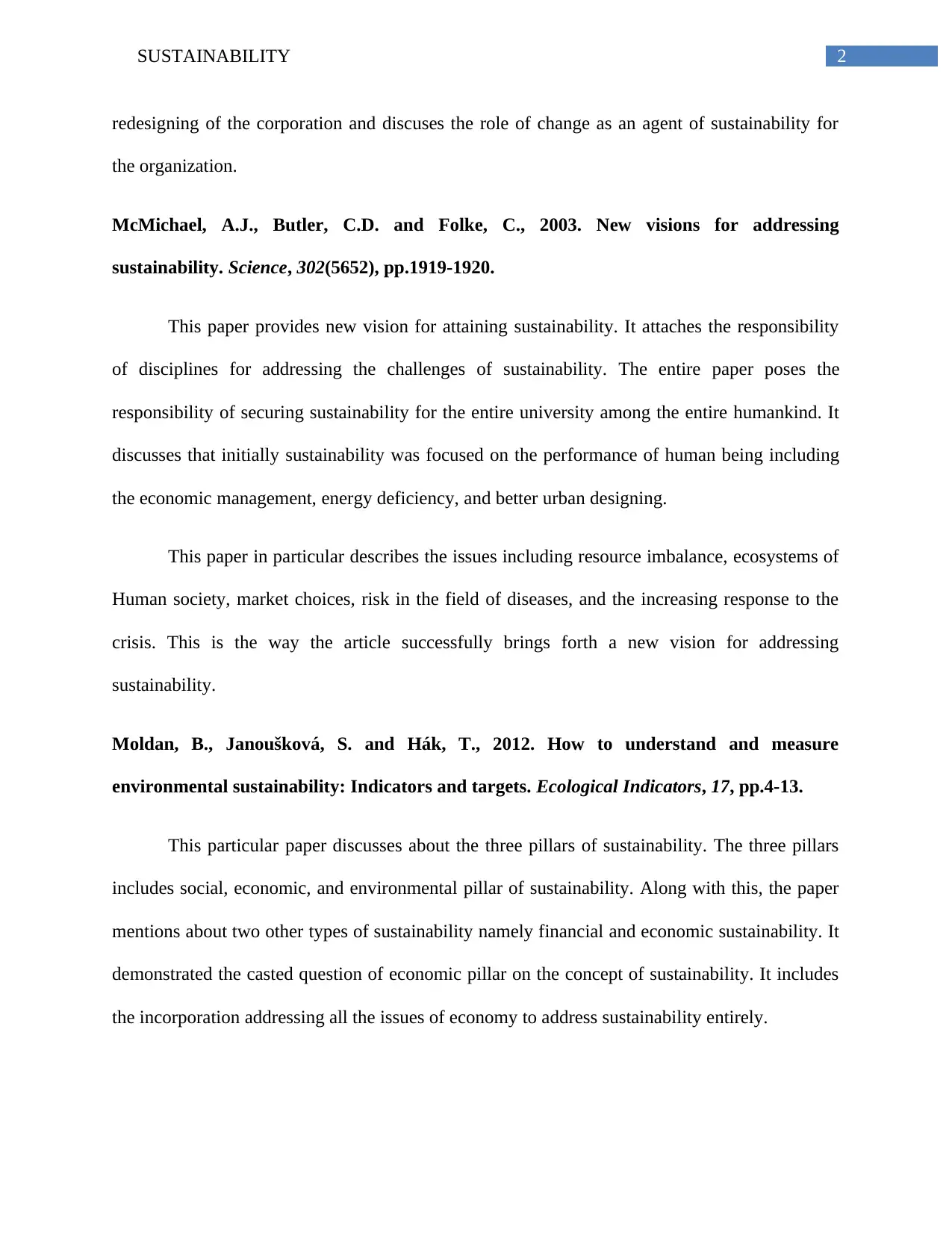
2SUSTAINABILITY
redesigning of the corporation and discuses the role of change as an agent of sustainability for
the organization.
McMichael, A.J., Butler, C.D. and Folke, C., 2003. New visions for addressing
sustainability. Science, 302(5652), pp.1919-1920.
This paper provides new vision for attaining sustainability. It attaches the responsibility
of disciplines for addressing the challenges of sustainability. The entire paper poses the
responsibility of securing sustainability for the entire university among the entire humankind. It
discusses that initially sustainability was focused on the performance of human being including
the economic management, energy deficiency, and better urban designing.
This paper in particular describes the issues including resource imbalance, ecosystems of
Human society, market choices, risk in the field of diseases, and the increasing response to the
crisis. This is the way the article successfully brings forth a new vision for addressing
sustainability.
Moldan, B., Janoušková, S. and Hák, T., 2012. How to understand and measure
environmental sustainability: Indicators and targets. Ecological Indicators, 17, pp.4-13.
This particular paper discusses about the three pillars of sustainability. The three pillars
includes social, economic, and environmental pillar of sustainability. Along with this, the paper
mentions about two other types of sustainability namely financial and economic sustainability. It
demonstrated the casted question of economic pillar on the concept of sustainability. It includes
the incorporation addressing all the issues of economy to address sustainability entirely.
redesigning of the corporation and discuses the role of change as an agent of sustainability for
the organization.
McMichael, A.J., Butler, C.D. and Folke, C., 2003. New visions for addressing
sustainability. Science, 302(5652), pp.1919-1920.
This paper provides new vision for attaining sustainability. It attaches the responsibility
of disciplines for addressing the challenges of sustainability. The entire paper poses the
responsibility of securing sustainability for the entire university among the entire humankind. It
discusses that initially sustainability was focused on the performance of human being including
the economic management, energy deficiency, and better urban designing.
This paper in particular describes the issues including resource imbalance, ecosystems of
Human society, market choices, risk in the field of diseases, and the increasing response to the
crisis. This is the way the article successfully brings forth a new vision for addressing
sustainability.
Moldan, B., Janoušková, S. and Hák, T., 2012. How to understand and measure
environmental sustainability: Indicators and targets. Ecological Indicators, 17, pp.4-13.
This particular paper discusses about the three pillars of sustainability. The three pillars
includes social, economic, and environmental pillar of sustainability. Along with this, the paper
mentions about two other types of sustainability namely financial and economic sustainability. It
demonstrated the casted question of economic pillar on the concept of sustainability. It includes
the incorporation addressing all the issues of economy to address sustainability entirely.
⊘ This is a preview!⊘
Do you want full access?
Subscribe today to unlock all pages.

Trusted by 1+ million students worldwide
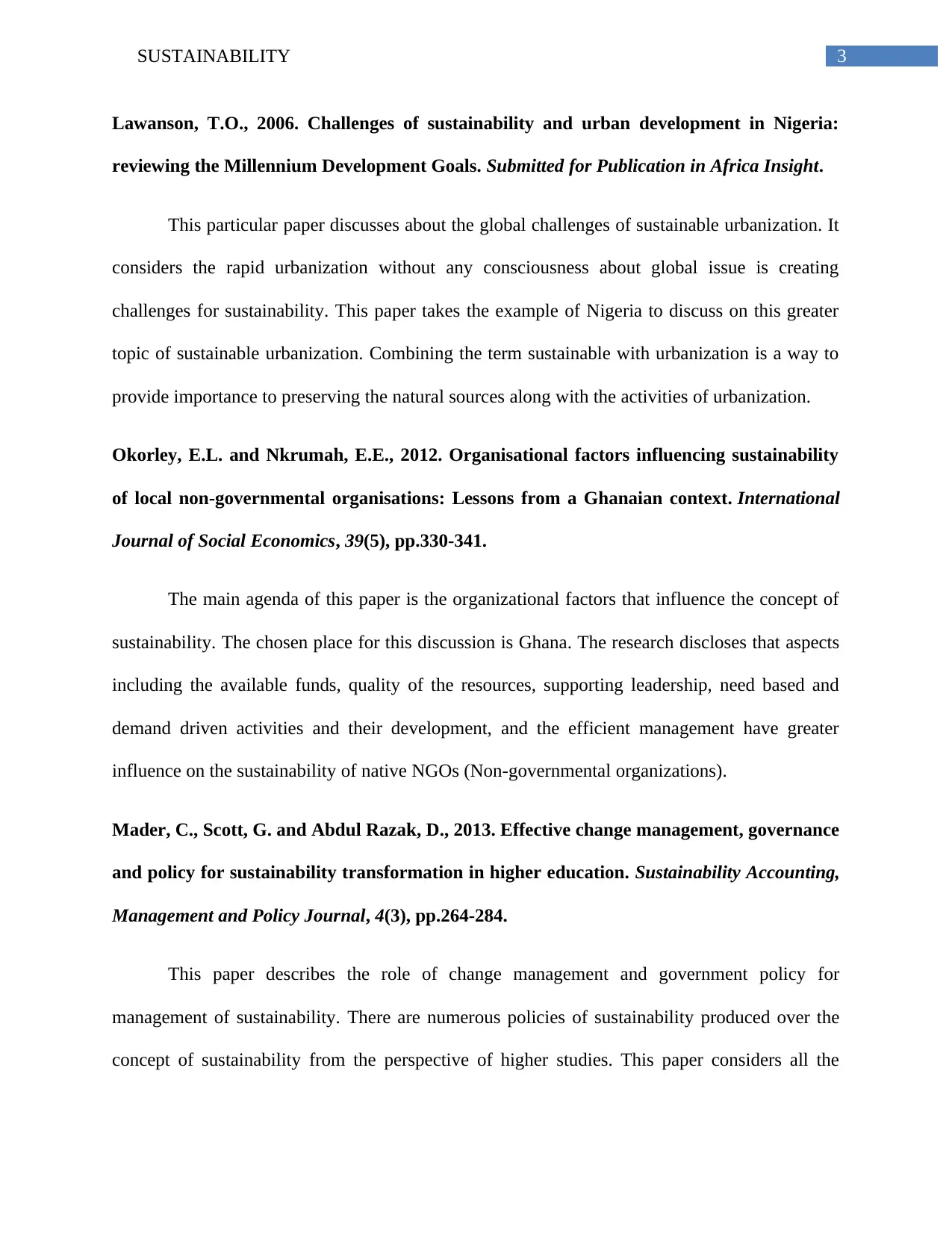
3SUSTAINABILITY
Lawanson, T.O., 2006. Challenges of sustainability and urban development in Nigeria:
reviewing the Millennium Development Goals. Submitted for Publication in Africa Insight.
This particular paper discusses about the global challenges of sustainable urbanization. It
considers the rapid urbanization without any consciousness about global issue is creating
challenges for sustainability. This paper takes the example of Nigeria to discuss on this greater
topic of sustainable urbanization. Combining the term sustainable with urbanization is a way to
provide importance to preserving the natural sources along with the activities of urbanization.
Okorley, E.L. and Nkrumah, E.E., 2012. Organisational factors influencing sustainability
of local non-governmental organisations: Lessons from a Ghanaian context. International
Journal of Social Economics, 39(5), pp.330-341.
The main agenda of this paper is the organizational factors that influence the concept of
sustainability. The chosen place for this discussion is Ghana. The research discloses that aspects
including the available funds, quality of the resources, supporting leadership, need based and
demand driven activities and their development, and the efficient management have greater
influence on the sustainability of native NGOs (Non-governmental organizations).
Mader, C., Scott, G. and Abdul Razak, D., 2013. Effective change management, governance
and policy for sustainability transformation in higher education. Sustainability Accounting,
Management and Policy Journal, 4(3), pp.264-284.
This paper describes the role of change management and government policy for
management of sustainability. There are numerous policies of sustainability produced over the
concept of sustainability from the perspective of higher studies. This paper considers all the
Lawanson, T.O., 2006. Challenges of sustainability and urban development in Nigeria:
reviewing the Millennium Development Goals. Submitted for Publication in Africa Insight.
This particular paper discusses about the global challenges of sustainable urbanization. It
considers the rapid urbanization without any consciousness about global issue is creating
challenges for sustainability. This paper takes the example of Nigeria to discuss on this greater
topic of sustainable urbanization. Combining the term sustainable with urbanization is a way to
provide importance to preserving the natural sources along with the activities of urbanization.
Okorley, E.L. and Nkrumah, E.E., 2012. Organisational factors influencing sustainability
of local non-governmental organisations: Lessons from a Ghanaian context. International
Journal of Social Economics, 39(5), pp.330-341.
The main agenda of this paper is the organizational factors that influence the concept of
sustainability. The chosen place for this discussion is Ghana. The research discloses that aspects
including the available funds, quality of the resources, supporting leadership, need based and
demand driven activities and their development, and the efficient management have greater
influence on the sustainability of native NGOs (Non-governmental organizations).
Mader, C., Scott, G. and Abdul Razak, D., 2013. Effective change management, governance
and policy for sustainability transformation in higher education. Sustainability Accounting,
Management and Policy Journal, 4(3), pp.264-284.
This paper describes the role of change management and government policy for
management of sustainability. There are numerous policies of sustainability produced over the
concept of sustainability from the perspective of higher studies. This paper considers all the
Paraphrase This Document
Need a fresh take? Get an instant paraphrase of this document with our AI Paraphraser
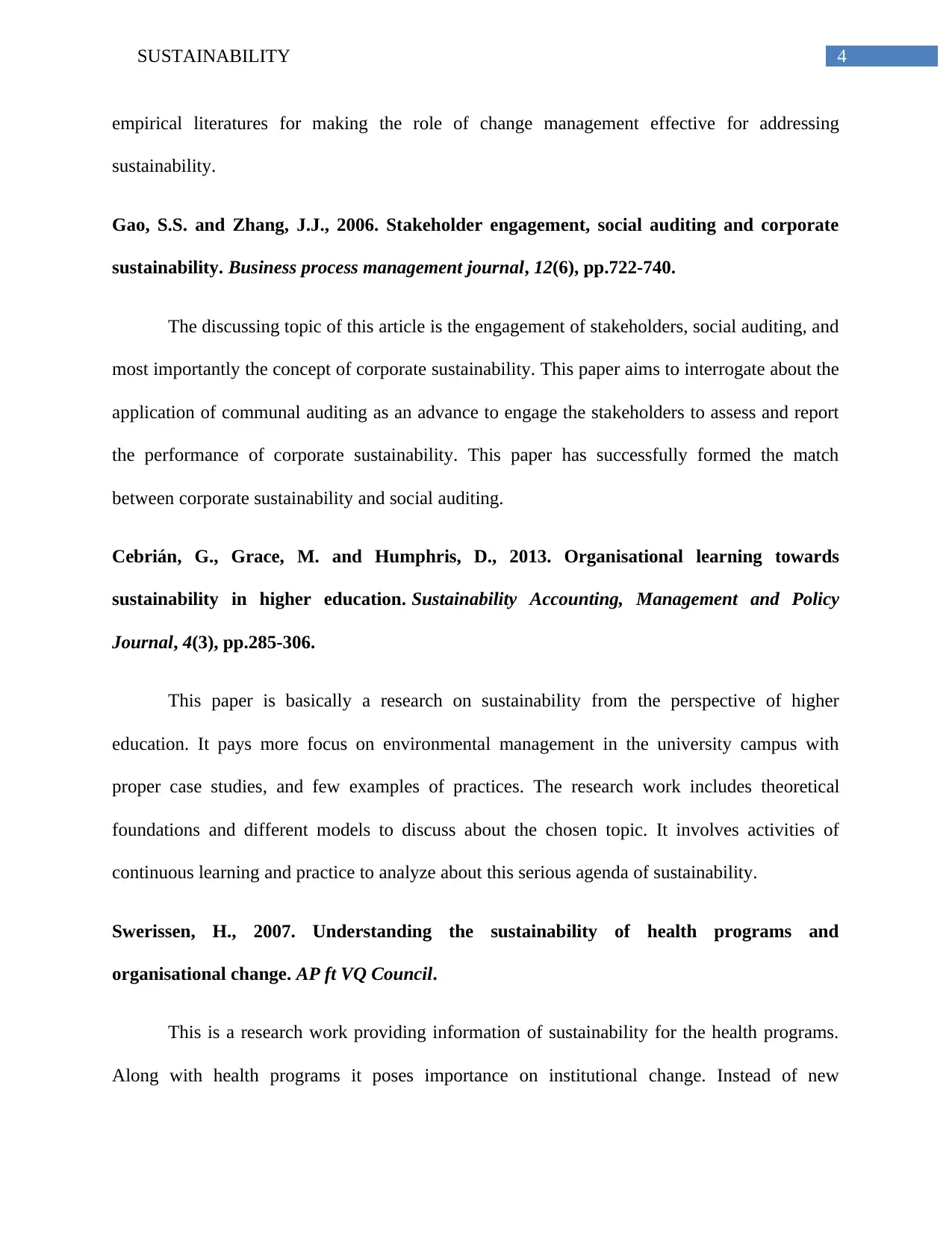
4SUSTAINABILITY
empirical literatures for making the role of change management effective for addressing
sustainability.
Gao, S.S. and Zhang, J.J., 2006. Stakeholder engagement, social auditing and corporate
sustainability. Business process management journal, 12(6), pp.722-740.
The discussing topic of this article is the engagement of stakeholders, social auditing, and
most importantly the concept of corporate sustainability. This paper aims to interrogate about the
application of communal auditing as an advance to engage the stakeholders to assess and report
the performance of corporate sustainability. This paper has successfully formed the match
between corporate sustainability and social auditing.
Cebrián, G., Grace, M. and Humphris, D., 2013. Organisational learning towards
sustainability in higher education. Sustainability Accounting, Management and Policy
Journal, 4(3), pp.285-306.
This paper is basically a research on sustainability from the perspective of higher
education. It pays more focus on environmental management in the university campus with
proper case studies, and few examples of practices. The research work includes theoretical
foundations and different models to discuss about the chosen topic. It involves activities of
continuous learning and practice to analyze about this serious agenda of sustainability.
Swerissen, H., 2007. Understanding the sustainability of health programs and
organisational change. AP ft VQ Council.
This is a research work providing information of sustainability for the health programs.
Along with health programs it poses importance on institutional change. Instead of new
empirical literatures for making the role of change management effective for addressing
sustainability.
Gao, S.S. and Zhang, J.J., 2006. Stakeholder engagement, social auditing and corporate
sustainability. Business process management journal, 12(6), pp.722-740.
The discussing topic of this article is the engagement of stakeholders, social auditing, and
most importantly the concept of corporate sustainability. This paper aims to interrogate about the
application of communal auditing as an advance to engage the stakeholders to assess and report
the performance of corporate sustainability. This paper has successfully formed the match
between corporate sustainability and social auditing.
Cebrián, G., Grace, M. and Humphris, D., 2013. Organisational learning towards
sustainability in higher education. Sustainability Accounting, Management and Policy
Journal, 4(3), pp.285-306.
This paper is basically a research on sustainability from the perspective of higher
education. It pays more focus on environmental management in the university campus with
proper case studies, and few examples of practices. The research work includes theoretical
foundations and different models to discuss about the chosen topic. It involves activities of
continuous learning and practice to analyze about this serious agenda of sustainability.
Swerissen, H., 2007. Understanding the sustainability of health programs and
organisational change. AP ft VQ Council.
This is a research work providing information of sustainability for the health programs.
Along with health programs it poses importance on institutional change. Instead of new
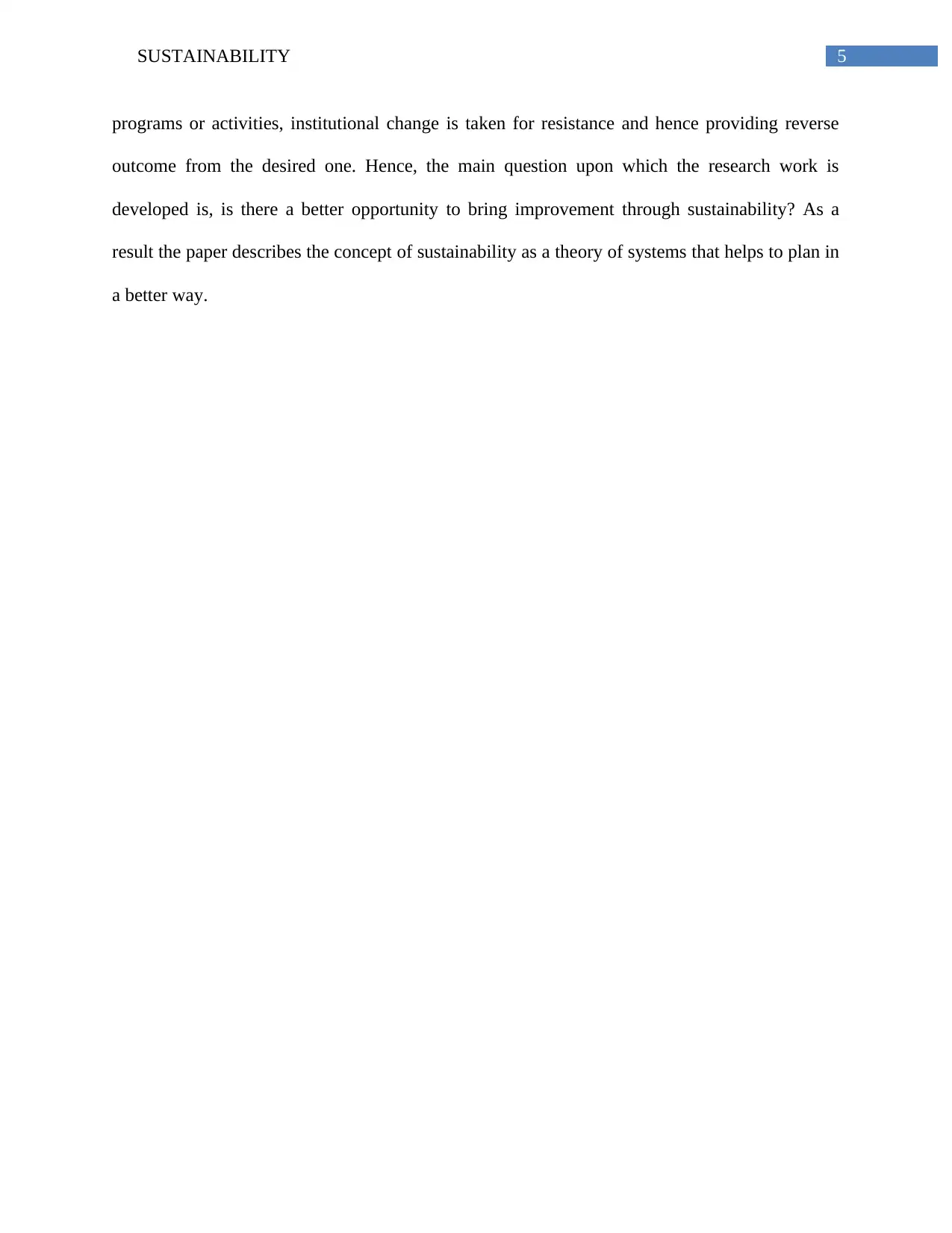
5SUSTAINABILITY
programs or activities, institutional change is taken for resistance and hence providing reverse
outcome from the desired one. Hence, the main question upon which the research work is
developed is, is there a better opportunity to bring improvement through sustainability? As a
result the paper describes the concept of sustainability as a theory of systems that helps to plan in
a better way.
programs or activities, institutional change is taken for resistance and hence providing reverse
outcome from the desired one. Hence, the main question upon which the research work is
developed is, is there a better opportunity to bring improvement through sustainability? As a
result the paper describes the concept of sustainability as a theory of systems that helps to plan in
a better way.
⊘ This is a preview!⊘
Do you want full access?
Subscribe today to unlock all pages.

Trusted by 1+ million students worldwide
1 out of 6
Related Documents
Your All-in-One AI-Powered Toolkit for Academic Success.
+13062052269
info@desklib.com
Available 24*7 on WhatsApp / Email
![[object Object]](/_next/static/media/star-bottom.7253800d.svg)
Unlock your academic potential
Copyright © 2020–2026 A2Z Services. All Rights Reserved. Developed and managed by ZUCOL.





